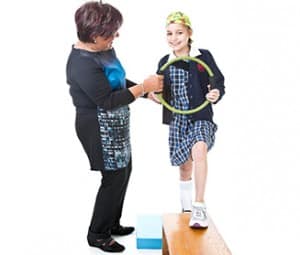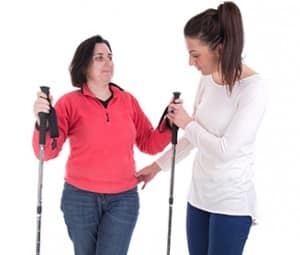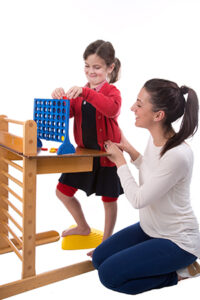Balance Assessment
 Balance is a complex process involving the coordination and integration of multiple sensory, motor, and biomechanical components. If a deficit is apparent with any one or more of the components involved in maintaining balance an individual will experience a certain degree of impairment.
Balance is a complex process involving the coordination and integration of multiple sensory, motor, and biomechanical components. If a deficit is apparent with any one or more of the components involved in maintaining balance an individual will experience a certain degree of impairment.
Our assessment will look at an individual’s ability to balance in lying, sitting, standing and walking. Whist simultaneously analysing varying systems such as; the individual’s alignment of their head, neck and pelvis, core and pelvic control, visual ocular motor skills and balance/righting reactions.
Use of specialist equipment may also be utilised to assist us with gaining an accurate clinical picture of an individual’s level of static balance. The RS Foot scan measures the degree of postural sway in standing. In addition a measure of the level of force throughout the feet and the location of the centre of gravity is recorded and illustrated.
Gait Analysis
Analysis of an individual’s gait pattern involves visual assessment of body alignment and movement, muscle activation, visual ocular motor skills, speed and co-ordination. The individuals walking will also be filmed to provide an objective measure to enable accurate measure of progress. Furthermore the use of Electromyography may be required, if deemed necessary by the treating therapist, which provides an electronic reading of the level of activation of set muscle groups via wireless sensors applied to the skin
Postural Analysis
Postural alignment is the keystone upon which we base our movements; therefore poor alignment will have a significant impact upon the ease and  efficiency in which we move. For individuals who have Neurological impairment, to maximise the rehabilitative process it is crucial that correct alignment is achieved to promote and enable normal movement patterns.
efficiency in which we move. For individuals who have Neurological impairment, to maximise the rehabilitative process it is crucial that correct alignment is achieved to promote and enable normal movement patterns.
In our assessment we will assess an individual’s posture in all postural sets such as lying, sitting or standing and specialist equipment such as the RS foot scan, Electromyography and Clinical Photography to enable accurate clinical assessment.
Cognitive Assessment
Cognition is the mental action or process of acquiring knowledge through thought, experience, and the senses.
The cognition can be affected in a neurological disorder in many ways:
 The visual spatial organisation, i.e. the relationship between where things are placed in the environment and in relation to the person
The visual spatial organisation, i.e. the relationship between where things are placed in the environment and in relation to the person- It can be the working memory, planning or organisation
- It can be perceiving information, learning, understanding, comprehension, intelligence, reasoning, thinking
- Poor insight and awareness of yourself and your environment
- Difficulty in problem solving, planning and organising
- An individual may be irritable and impulsive and show perseverance
- Difficulty in copying and recall
At the Birkdale Paediatric and Adult Physio Clinic we will include tests for the above into our assessment, in order to gain an accurate clinical picture of the child or adult and their cognitive function.



